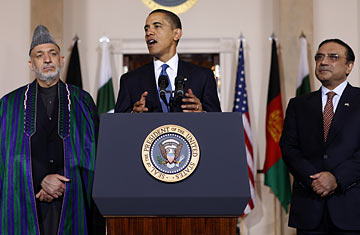
President Barack Obama makes a statement to reporters in the White House after his meeting with Afghan President Hamid Karzai, left, and Pakistani President Asif Ali Zardari.
(4 of 5)
Israel: Little Help from Bibi
President Obama believes it is critical to wider U.S. interests across the
Middle East to urgently implement a two-state solution to the
Israeli-Palestinian conflict. Indeed, he believes it is vital to Israel's
own interest, even as the clock runs out on the viability of such a
solution. However, Israel's new prime minister, Benjamin Netanyahu, sees
things differently. Netanyahu has until now resisted the idea of an
independent Palestinian state, arguing that the Palestinians should enjoy
self-governance but without full sovereignty, because that would put Israel
at risk. Anyway, he argues, the Palestinians' governance, security
capability and level of economic development currently make talk of
statehood hypothetical. Hamas rules Gaza and threatens the West Bank, where
the Palestinian Authority of President Mahmoud Abbas is increasingly weak. (See pictures of the recent Gaza war)
Netanyahu says he wants peace with the Palestinians, but he sees the immediate priority as strengthening economic development and the security capability of the Palestinian Authority. Even that, however, is of secondary importance for the Israeli Prime Minister. Netanyahu sees the overwhelming priority of both Israel and the U.S. as Iran, and he has made stopping Tehran's nuclear program his overarching priority. Defanging Iran, his aides argue, is also the key to any progress with the Palestinians, because the Israelis claim that Hamas is nothing more than an Iranian proxy. And while the Obama Administration has begun unfurling a strategy of engagement aimed at addressing the nuclear question and other points of tension with Iran, Netanyahu has warned that time is short and that Israel will act militarily if U.S. diplomacy fails to halt uranium enrichment in Iran. (The Pentagon fears that military action will be ineffective in stopping Iran from pursuing nuclear weapons, and would trigger an even more dangerous regional war.) While Netanyahu — like Maliki, Karzai and Zardari — will likely utter the platitudes Washington expects of him, he's unlikely to actually move forward with implementing Washington's policy. And he may be counting on Israel's strong bipartisan support on Capitol Hill to minimize pressure from Obmaa to act against his instincts.
NEXT: The Palestinian Authority
